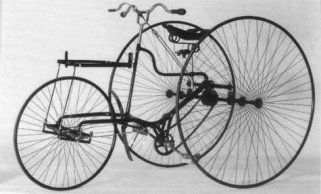ca. 1880-1885 Quadrant Tricycle

Description
On its way to becoming a worldwide transportation and recreation vehicle, the bicycle went through many different shapes and sizes. In the 1800s, most bicycles were primarily “high wheelers”—bicycles with an oversized front wheel, a very small rear wheel and pedals that attached directly to the hub of the front wheel. These bikes were very fast, but also difficult to get on to, easy to fall off of and difficult to…
On its way to becoming a worldwide transportation and recreation vehicle, the bicycle went through many different shapes and sizes. In the 1800s, most bicycles were primarily “high wheelers”—bicycles with an oversized front wheel, a very small rear wheel and pedals that attached directly to the hub of the front wheel. These bikes were very fast, but also difficult to get on to, easy to fall off of and difficult to control. As such, they were operated by only the very adventurous..
Cycle builders, like Quadrant Cycle Company in England, saw tricycles as a chance to expand the market from tens of thousands of riders into millions. Unlike today, tricycles were for adults, not children. They were far more easily mounted than the high wheeler bicycles, their riders didn’t have to worry about balance the way they would on what we now consider a “normal” bicycle and women could ride them with little danger of catching their heavy skirts in the gears. Queen Victoria purchased two tricycles for the British royal family, giving them a seal of approval from one of the world’s most powerful women.
Many tricycles had seats and pedals for two riders, whether tandem with one person in front of the other or “sociables”, which had side-by-side seats. Both were popular with siblings, friends and, unsurprisingly, couples. In 1885, a young couple from Philadelphia wrote a book about their riding tour of England on a tandem tricycle. Then as now, there were hostile horse-drawn carriage drivers and dogs that gave chase, but also many other cycling tourists, some on high-wheelers and some also on tricycles. Cycling clubs were springing up in many countries, and the locals were gradually becoming accustomed to these strange, horseless contraptions.
In 1885, the same year that Quadrant made this Tricycle Velocipede, the first safety bicycles were produced. Revolutionary , they offered the standard frame design still seen today. By mounting the pedals on gears linked by a chain, the wheels of the bike could be made much smaller and easier to control. Within a decade, an explosion of safety bike sales had doomed the once-bright future of the adult tricycle.
